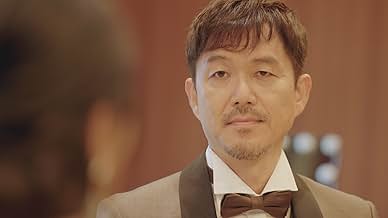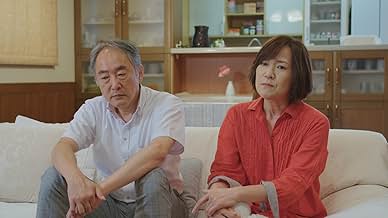IMDb RATING
7.0/10
1.1K
YOUR RATING
In this reality dating series, marriage-minded singles in Japan meet, date, and get engaged before ever setting eyes on each other.In this reality dating series, marriage-minded singles in Japan meet, date, and get engaged before ever setting eyes on each other.In this reality dating series, marriage-minded singles in Japan meet, date, and get engaged before ever setting eyes on each other.
Browse episodes
Featured reviews
Love is Blind Japan presents a captivating departure from the familiar dramatic flair of its American and Swedish counterparts. Unlike the exaggerated narratives that often overshadow sincerity in those versions, the Japanese adaptation offers a refreshing authenticity. Contestants in the Japanese version exhibit a keen awareness of their conversations, emphasizing meaningful dialogue over scripted drama.
One notable aspect is how conflicts are approached with artful skill and respect, showcasing a cultural nuance that adds depth to the show. The contestants, in their pursuit of love, demonstrate an admirable commitment to genuine connections. In a television landscape saturated with manufactured drama, Love is Blind Japan stands out as a more serious and realistic social experiment.
The subdued and muted demeanor of the participants contributes to a less theatrical, more realistic portrayal of relationships. The editing, too, reflects a commitment to authenticity, creating an immersive viewing experience. This Japanese adaptation feels less predictable than its American counterpart, providing a refreshing and unpredictable take on the familiar reality TV formula. For those seeking a departure from the norm, Love is Blind Japan offers a thoughtful and nuanced exploration of love and relationships. The cultural nuance in conflict resolution, although admirable, might not resonate with audiences seeking the thrill of more confrontational shows. The show's commitment to authenticity, while commendable, may inadvertently contribute to a less engaging viewing experience for some.
In the grand landscape of reality TV, where sensationalism often reigns supreme, Love is Blind Japan earns points for sincerity but might lose others for perceived boredom. Its unique approach may appeal to those craving a more realistic portrayal of relationships, but it could leave others longing for the exaggerated drama characteristic of many reality shows.
Considering the mix of cultural depth and potential dullness, the show earns a modest verdict of 6.5. While it offers a different flavor of reality TV, its appeal may be subjective, catering to those who appreciate subtlety in love stories but falling short for those seeking more traditional entertainment. Making it boring and uninteresting.
One notable aspect is how conflicts are approached with artful skill and respect, showcasing a cultural nuance that adds depth to the show. The contestants, in their pursuit of love, demonstrate an admirable commitment to genuine connections. In a television landscape saturated with manufactured drama, Love is Blind Japan stands out as a more serious and realistic social experiment.
The subdued and muted demeanor of the participants contributes to a less theatrical, more realistic portrayal of relationships. The editing, too, reflects a commitment to authenticity, creating an immersive viewing experience. This Japanese adaptation feels less predictable than its American counterpart, providing a refreshing and unpredictable take on the familiar reality TV formula. For those seeking a departure from the norm, Love is Blind Japan offers a thoughtful and nuanced exploration of love and relationships. The cultural nuance in conflict resolution, although admirable, might not resonate with audiences seeking the thrill of more confrontational shows. The show's commitment to authenticity, while commendable, may inadvertently contribute to a less engaging viewing experience for some.
In the grand landscape of reality TV, where sensationalism often reigns supreme, Love is Blind Japan earns points for sincerity but might lose others for perceived boredom. Its unique approach may appeal to those craving a more realistic portrayal of relationships, but it could leave others longing for the exaggerated drama characteristic of many reality shows.
Considering the mix of cultural depth and potential dullness, the show earns a modest verdict of 6.5. While it offers a different flavor of reality TV, its appeal may be subjective, catering to those who appreciate subtlety in love stories but falling short for those seeking more traditional entertainment. Making it boring and uninteresting.
It will bring to you all the emotions from being strangers thru to the process of getting married from different people's perspective.
Sometimes I feel sweetness, sometimes I feel stress when I put myself in the guys' shoes.
Definitely a must watch. I bet the girls will love this more than a guy do. But I am a guy! :)
I wish they can continue filming their lives but alas, it's not possible as once the love ends, most likely they will never return.
Sometimes I feel sweetness, sometimes I feel stress when I put myself in the guys' shoes.
Definitely a must watch. I bet the girls will love this more than a guy do. But I am a guy! :)
I wish they can continue filming their lives but alas, it's not possible as once the love ends, most likely they will never return.
I like the premise of the first season of the American version, even though some of the contestants were disappointing in their behavior towards their partners. I had an inkling that the Japanese version of the show would be better than that first American version.
What really surprised me was the very healthy mix of contestants by the producers. Most of the contestants truly seemed more interested in being potential marital partners over promoting their own businesses or boosting their social media profiles.
In any matchmaking process, there are always going to be matches that don't work out along the way. An encouraging point is that these participants seem to have learned valuable lessons along the way, even if it didn't translate to forever love in front of the camera.
What really surprised me was the very healthy mix of contestants by the producers. Most of the contestants truly seemed more interested in being potential marital partners over promoting their own businesses or boosting their social media profiles.
In any matchmaking process, there are always going to be matches that don't work out along the way. An encouraging point is that these participants seem to have learned valuable lessons along the way, even if it didn't translate to forever love in front of the camera.
I'm really enjoying this show. After watching the American version, with a number of backstabbing/egocentric people, it's refreshing to witness a culture in which the participants are respectful and supportive of each other--even when they have differences.
Watching this has given me insight into Japanese culture.
PS Having just watched the final episodes, I raised my rating from 8 stars to 9. The kindness and respect between couples and families is amazing and enlightening.
Watching this has given me insight into Japanese culture.
PS Having just watched the final episodes, I raised my rating from 8 stars to 9. The kindness and respect between couples and families is amazing and enlightening.
I really enjoyed this series. As an American that has never been to Japan, I found it even more interesting to learn about the culture and how the contestants went about dating. The contestants led with their brain instead of their heart which is typically seen in American dating shows. I also enjoyed seeing the places that they visited for the getaway and the apartments that they lived in leading up to the wedding. Plus their budget is huge as shown by the design for the pods, living quarters, the flower filled bridge for where the couple meets if they get engaged and the hotel for the getaway!
The contestants took the experience seriously especially when compared to those on the American version. Although some of the contestants fell for the same person, there wasn't any animosity or drama over it. There were no cat fights and both the male and female groups provided a sense of support for one another. This show was filled with love and you can't but hope that everyone finds someone.
I liked that the couples who did get "married" or just walked down the aisle showed that it is possible to fall in love without seeing the other first. I enjoyed hearing about their reservations before the wedding and how they worked on them as a couple. All of the couples took the dating process more seriously and that is shown in the types of conversations that they had on the dates.
The contestants took the experience seriously especially when compared to those on the American version. Although some of the contestants fell for the same person, there wasn't any animosity or drama over it. There were no cat fights and both the male and female groups provided a sense of support for one another. This show was filled with love and you can't but hope that everyone finds someone.
I liked that the couples who did get "married" or just walked down the aisle showed that it is possible to fall in love without seeing the other first. I enjoyed hearing about their reservations before the wedding and how they worked on them as a couple. All of the couples took the dating process more seriously and that is shown in the types of conversations that they had on the dates.
Did you know
- TriviaContestant Priya is Priya Yoshikawa, who was Miss World Japan in 2016.
- How many seasons does Love Is Blind: Japan have?Powered by Alexa
Details
- Release date
- Country of origin
- Official site
- Language
- Also known as
- Love is Blind: Japan
- Filming locations
- Production company
- See more company credits at IMDbPro
Contribute to this page
Suggest an edit or add missing content


























